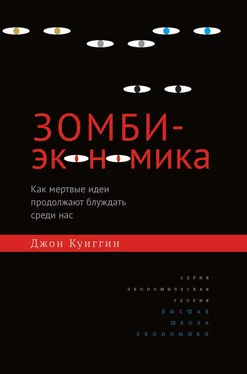Blanchard O., Summers L. Hysteresis and the European Unemployment Problem//NBER Macroeconomics Annual. 1986. Vol. 1. P. 15–78.
Blanden J., Goodman A., Gregg P., Machin S. Changes in Intergenerational Mobility in Britain // M. Corak (ed.). Generational Income Mobility in North America and Europe. Cambridge: Cambridge University Press, 2004. P. 122–146.
Bon o C., Lowe P. Monetary Policy: A Subtle Paradigm Shift? // World Economics. 2003. Vol. 4 (2). P. 103–119.
Boskin M. et al. Consumer Prices, the Consumer Price Index and the Cost of Living// Journal of Economic Perspectives. 1998. Vol. 12 (1). P. 3–26.
Bowen W., Bok D. The Shape of the River: Long-Term Consequences of Considering Race in College and University Admissions. Princeton: Princeton University Press, 1998.
Bradbury K. The Shrinking Middle Class // New England Economic Review. 1986. September. P. 41–55.
Bramley G. Horizontal Disparities and Equalization: A Critique of Paying for Local Government // Local Government Studies. 1987. Vol. 13 (1). P. 69–89.
Brittan S. A Restatement of Economic Liberalism. London: Palgrave Macmillan, 1988.
Buchanan]., Tullock G. The Calculus of Consent: Logical Foundations of Constitutional Democracy. Ann Arbor: University of Michigan Press, 1965.
Buiter W. The Unfortunate Uselessness of Most 'State of the Art' Academic Monetary Economics. 2009. (accessed 10 May, 2010).
Buiter W., Miller M. The Thatcher Experiment: The First Two Years // Brookings Papers on Economic Activity. 1981. No. 2. P. 315–379.
Bureau of Economic Analysis. National Economic Accounts. 2010. (accessed 28 January 2010).
Burtless G. A Future of Lousy Jobs? The Changing Structure of U. S. Wages. Washington, DC: Brookings Institution Press, 1990.
Cant o V., Jones D., Laffer A. Foundations of Supply Side Economics: Theory and Evidence (Economic Theory, Econometrics, and Mathematical Economics). New York: Academic Press, 1982.
Cassidy J. After the Blowup (Letter From Chicago) // New Yorker. 2010. 11 January. P. 28.
Central Intelligence Agency (CIA) // World Factbook. 2009. (accessed 28 January, 2009).
Chamberlin E. The Theory of Monopolistic Competition. Cambridge, MA: Harvard University Press, 1933.
Clark C. The National Income 1924–1931. London: Macmillan, 1932.
Clark G. Dismal Scientists: How the Crash is Reshaping Economics // Atlantic Monthly. 2009. 16 February. .
Coase R. The Problem of Social Cost // Journal of Law and Economics. 1960. Vol. 3 (1). P. 1–44.
Cochrane J. How Did Paul Krugman Get it So Wrong? 2009. .
Cockett R. Thinking the Unthinkable: Think-Tanks and the Economic Counter-Revolution, 1931–1983. London: HarperCollins, 1995.
Coddington A. Keynesian Economics: The Search for First Principles // Journal of Economic Literature. 1976. Vol. 14 (4). P. 1258–1273.
Coibion O., Gorodnichenk o Y. Monetary Policy, Trend Inflation, and the Great Moderation: An Alternative Interpretation. NBER Working Paper No. 14621. Cambridge, MA: National Bureau of Economic Research, 2008.
Coibion О., Gorodnichenk o Y. Does the Great Recession Really Mean the End of the Great Moderation? 2010. (accessed 2 March, 2010).
Cole H., Ohanian L. New Deal Policies and the Persistence of the Great Depression: A General Equilibrium Analysis // Journal of Political Economy. 2004. Vol. 112 (4). P. 779–816.
Commonwealth of Australia. Full Employment in Australia. Canberra: Commonwealth Government Printer, 1945.
Cox M., Alm R. Myths of Rich and Poor: Why We're Better off Than We Think New York: Basic Books, 2000.
Davidson P. Is Probability Theory Relevant for Uncertainty? A Post-Keynesian Perspective // Journal of Economic Perspectives. 1991. Vol. 5 (1). P. 129–143.
Davis J., Ossowski R., Richardson Т., Barnett S. Fiscal and Macroeconomic Impact of Privatization. Washington, DC: International Monetary Fund, 2000.
Debreu G. Theory of Value. New York: Wiley, 1959.
DeLongB. Which Economists Got It So Wrong? 2009a. (accessed 16 May, 2010).
DeLong B. Why Does the New York Times Publish Casey Mulligan? 2009b. (accessed 15 May, 2010).
DeLongB. How Scared of the Future Should Macroeconomists Be? 2010. (accessed 2 March, 2010).
Doster A. Durbin on Congress: The Banks 'Own The Place'. 2009. .
Downs A. An Economic Theory of Democracy. New York: Harper &Row, 1957.
Drucker P. The Age of Discontinuity. New York: Harper & Row, 1969.
Dynan K., Elmendorf D., Sichel D. Financial Innovation and the Great Moderation: What Do Household Data Say? Paper presented at Financial Innovations and the Real Economy, Federal Reserve Bank of San Francisco. 2006. .
Easton B. The Commercialisation of New Zealand. Auckland: Auckland University Press, 1997.
Easton В. What Has Happened in New Zealand to Income Distribution and Poverty Levels? // Social Policy for the Twenty-first Century: Justice and Responsibility // S. Shaver, P. Saunders (eds). Proceedings of the National Social Policy Conference, Sydney, 21–23 July. Sydney: Social Policy Research Centre. 1999. Vol. 2. P. 55–66.
Ehrenreich B. Fear of Falling: The Inner Life of the Middle Class. New York: Harper Perennial, 1990.
Ehrenreich B. Nicked and Dimed: On (Not) Getting By in America. New York: Metropolitan Books, 2001.
Ellenberger J. We're Down $700 Billion. Let's Go Double or Nothing! Posted Aug. 2 // Slate.com. 2008. .
Epstein L., Schneider M. Recursive Multiple-Priors // Journal of Economic Theory. 2003. Vol. 113 (1). P. 1–31.
European Anti-Poverty Network (Eapn). Poverty and Inequality in the European Union. 2009. .
Fama E. The Behavior of Stock-Market Prices // The Journal of Business. 1965. Vol. 38 (1). P. 34–105.
Fama E. Bailouts and Stimulus Plans. Posted Jan. 2009. .
Fama E. Efficient Capital Markets: A Review of Theory and Empirical Work// Journal of Finance. 1970. Vol. 25 (2). P. 383–417.
Feldstein M. The Effect of Marginal Tax Rates on Taxable Income: A Panel Study of the 1986 Tax Reform Act // Journal of Political Economy. 1995. Vol. 103 (3). P. 551–572.
Fellner W., Phelps E. S., Gordon R. J. The Credibility Effect and Rational Expectations: Implications of the Gramlich Study// Brookings Papers on Economic Activity. 1979. Vol. 1. P. 167–189.
Fisher G. The Development and History of the Poverty Thresholds // Social Security Bulletin. 1992. Vol. 55 (4). P. 3–14.
Fisher I. The Debt-Deflation Theory of Great Depressions // Econometrica. 1933. Vol. 1 (4). P. 337–357.
Food Research and Action Center (Frac). Hunger and Food Insecurity in the United States. 2009. (accessed 30 January, 2010).
Fox J. The Myth of the Rational Market: A History of Risk, Reward, and Delusion on Wall Street. New York: Harper Business, 2009.
Friedman M. The Role of Monetary Policy // American Economic Review. 1968. Vol. 68 (1). P. 1–17.
Friedman M., Friedman R. Free to Choose. New York: Harcourt Brace Jovanovich, 1980.
Friedman M., Heller WW Monetary versus Fiscal Polic. New York: W. W. Norton, 1969.
Friedman T. The Lexus and the Olive Tree: Understanding Globalization. New York: Farrar Strauss Giroux, 1999.
Fukuyama F. The End of History and the Last Man. New York: Free Press, 1992.
Fukuyama F. Trust: The Social Virtues and the Creation of Prosperity New York: Free Press, 1996.
Читать дальше
Конец ознакомительного отрывка
Купить книгу











